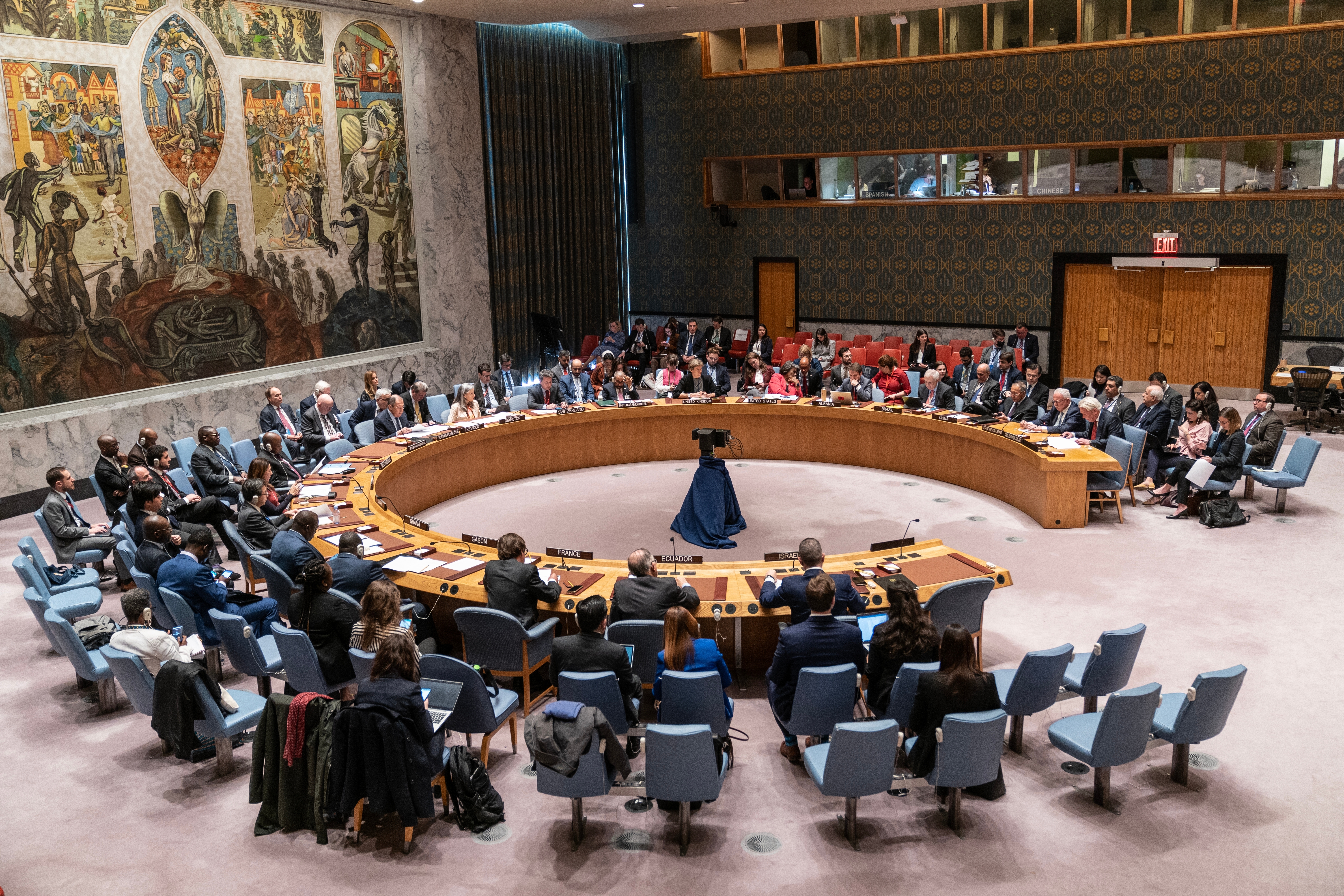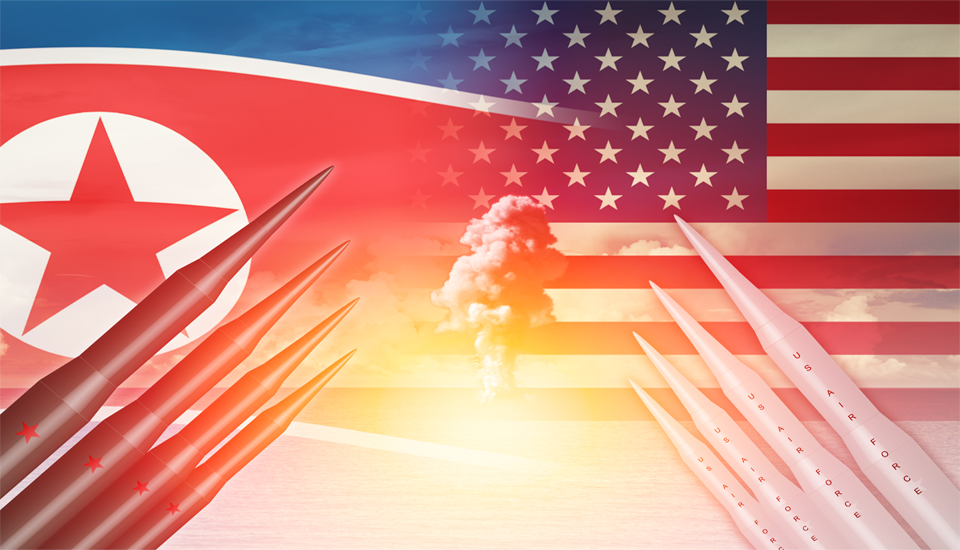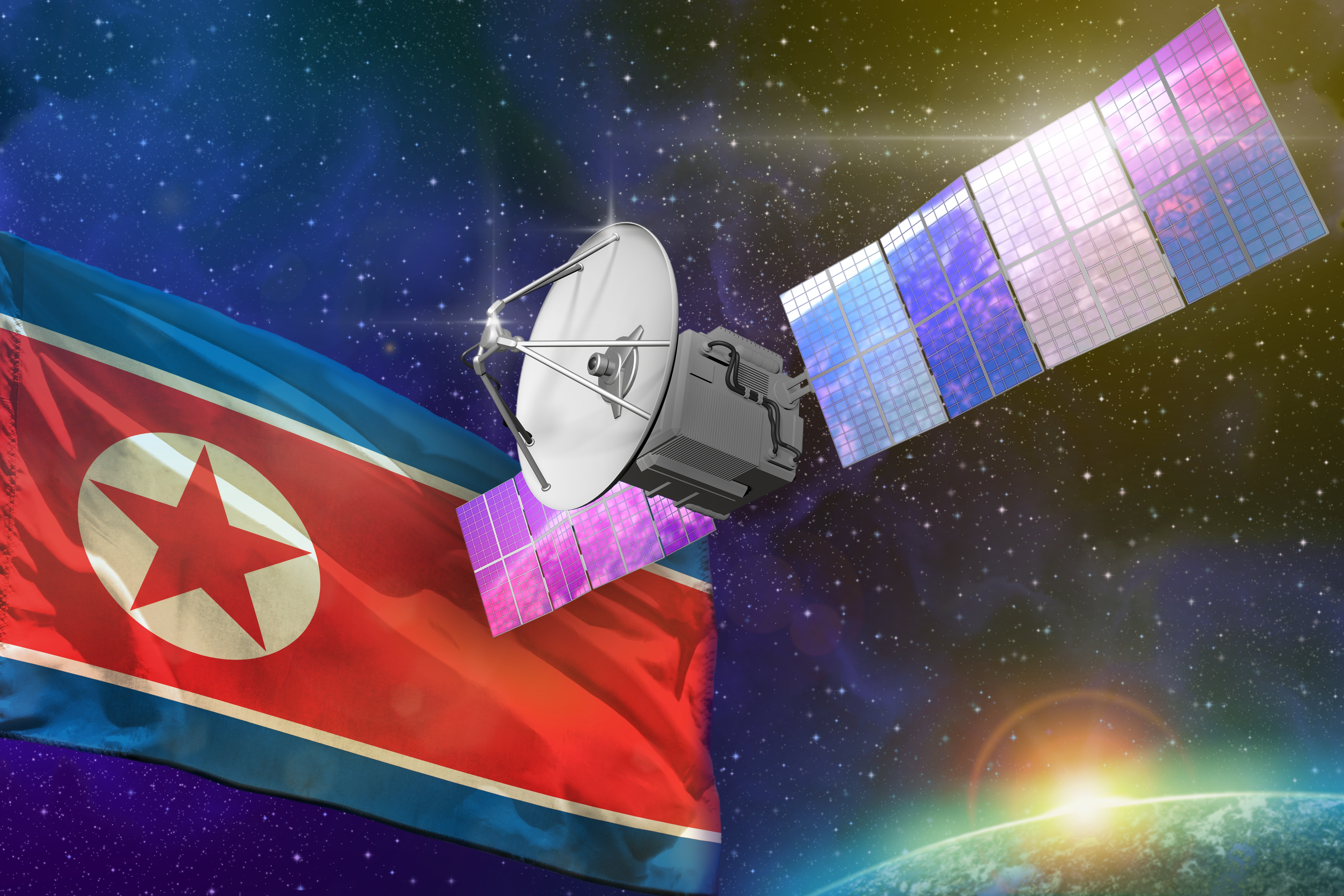
This month's NK Update covers North Korea's continued drive for space launch amid intensifying international pressure and South Korea's return to the UN Security Council as a nonpermanent member. Additionally, the report explores the Biden administration's decision to extend the declaration of a national emergency with regards to the North Korean threat.
Key Updates
1) North Korea strongly condemned the United Nations Security Council (UNSC)’s resolution against ballistic rocket technology and expressed its determination to develop reconnaissance capabilities, including military satellites.
2) Amidst a backdrop of mounting regional challenges, South Korea secured a seat on the UNSC and revealed its new National Security Strategy.
3) The U.S. expressed concern over North Korea’s ballistic missile launches and extended national emergency.
North Korea’s Space Launch amid Intensified Pressure
On May 31, North Korea launched a reconnaissance satellite, drawing significant attention from the international community. The launch was met with widespread criticism and concern among global stakeholders. Despite the international concerns, Pyongyang reiterated its right to conduct satellite launches and expressed its intention to continue such efforts in the future. In response to the event, international voices chimed in, expressing strong reservations about North Korea’s actions. Various countries and international organizations raised questions about the security implications of the satellite launch and its potential impact on regional stability.
Kim Yo Jong, the vice department director of the Central Committee of the Workers’ Party of Korea, further fueled the debate by releasing a press statement titled “Undeniable Sovereign Right of the DPRK to Launch Satellites” on June 1. In her statement, she strongly condemned the UNSC’s resolution that prohibits the use of ballistic rocket technology, irrespective of its purpose. Kim Yo Jong argued that this resolution not only violates North Korea’s rights but also serves as an attempt to oppress the country. She reiterated North Korea’s stance of not seeing the necessity for dialogue with the United States and its allies, who persistently advocate for the “end of regime” and the “overthrow of system.” Additionally, Kim Yo Jong emphasized North Korea's determination to develop reconnaissance capabilities, including military satellites, as part of its commitment to strengthen war deterrent (KCNA 2023a).
This assertion follows several other statements made by senior North Korean officials on the satellite issue. Jo Chol Su, director general of the Department of International Organizations of the Foreign Ministry, strongly protested the UN Secretary-General’s statement denouncing North Korea’s military reconnaissance satellite launch. He condemned it as an unfair act of interference in internal affairs and encroachment upon the country's legitimate sovereign right (KCNA 2023c). Furthermore, Kim Son Gyong, vice-minister of Foreign Affairs, criticized the framework of the Proliferation Security Initiative. Under this initiative, the United States plans to conduct a sea intercepting drill with Japan, South Korea, Australia, and other nations in late May (KCNA 2023b). The North Korean adversaries argue that the drill is merely a pretext for advancing US hegemony and implementing unilateral maritime transport interception and blockade. Moreover, a spokesperson for the Maritime Administration expressed strong regret at the International Maritime Organization’s (IMO) stance on prior notice of satellite launches. The spokesperson clarified that North Korea had informed the IMO through navigational warning data and that the IMO confirmed it was not obligatory to exclusively inform them (KCNA 2023d). North Korea criticized the IMO for adopting an unreasonable resolution denouncing their satellite launch without prior notice. The country emphasized that the role of the IMO is to promote technical cooperation and not to supervise the implementation of UN Security Council resolutions.
On the other hand, neighboring countries regard North Korea’s satellite launch as part of its nuclear threat and condemn it. The South Korean government emphasized that the long-range ballistic missile launch was in violation of multiple UN Security Council resolutions (MOFA 2023a; MND 2023a). Furthermore, the North Korean threat was a major topic of discussion during a trilateral ministerial meeting in Singapore on June 3, 2023, attended by U.S. Secretary of Defense Lloyd J. Austin III, Japanese Minister of Defense Hamada Yasukazu, and ROK Minister of National Defense Lee Jong-Sup (MOD 2023a; MND 2023b). They discussed the implementation of a data sharing mechanism to improve missile detection and assessment capabilities and affirmed their commitment to strengthening trilateral responses to North Korea’s nuclear and missile threats through various exercises and areas of cooperation. On the same date, Austin and Hamada held the Trilateral Defense Ministerial Meeting with Australian Deputy Prime Minister and Minister for Defense Richard Marles, during which they strongly condemned North Korea’s frequent missile launches, including intercontinental ballistic missiles, and its recent claimed space launch using ballistic missile technology, which violates UN Security Council resolutions (MOD 2023b).
South Korean Government’s Comprehensive Actions against Regional Security Threats
South Korea has been elected as a non-permanent member of the UNSC for the 2024-25 term (MOFA 2023b). This marks the third time holding this position, having previously served in 1996-97 and 2013-14. Out of 192 valid votes, South Korea secured 180 votes, winning in the Asia-Pacific Group. Given South Korea’s central role in the Korean Peninsula issue, it is anticipated that South Korea will play an active role in addressing the North Korean nuclear development threat within the UNSC and be committed to fostering close cooperation among Member States to facilitate the implementation of essential measures against the North Korean nuclear threat. In June, the South Korean government made concerted efforts to address North Korea's nuclear program both domestically and internationally.
On one hand, the South Korean government introduced “The Yoon Suk Yeol Administration’s National Security Strategy: Global Pivotal State for Freedom, Peace, and Prosperity” on June 7 (MOFA 2023c). The Strategy prioritizes the escalating nuclear and missile weapons of mass destruction (WMD) capabilities of North Korea as the primary security concern and calls for an enhanced trilateral cooperation among the United States, South Korea, and Japan. Chapter six, titled “Building Peace on the Korean Peninsula and Normalizing Inter-Korean Relations,” places significant emphasis on enhancing South Korea’s military capabilities to counter the nuclear and WMD threats posed by North Korea. Additionally, the strategy outlines key elements of the Audacious Initiative, which would be offered to North Korea if the government genuinely engages in negotiations for denuclearization (MOFA 2023b, 98).
On the other hand, on June 15, President Yoon Suk Yeol expressed his commitment to defending the nation and ensuring the safety of its people during the 2023 South Korea-US Combined Joint Live-Fire Exercise, commemorating the 75th anniversary of South Korea’s armed forces and the 70th anniversary of the ROK-U.S. Alliance (MND 2023c). More than 610 advanced military assets and 2,500 soldiers from South Korea and the United States participated in the exercise, which included a simulated full-scale attack and counterattack operations to annihilate North Korea’s military threats. President Yoon praised the the soldiers and emphasized the significance of the exercise which took place at the Seungjin Fire Training Field, symbolizing the longstanding alliance.
Furthermore, on June 27, the Korean Ministry of Foreign Affairs conducted its “first interministerial working-level meeting to implement the ‘Indo-Pacific Strategy’” (MOFA 2023d), marking the beginning of a full-fledged implementation of the strategy. These discussions indicate that South Korea’s approach to security issues, including the North Korean nuclear problem, will be aligned with the Indo-Pacific Strategy. The South Korean government is closely monitoring the increasing alignment among China, Russia, and North Korea, while recognizing diminished cooperation incentives in Northeast Asia. On the other hand, it emphasizes economic and technological cooperation with “friendly nations,” with a focus on the ROK-U.S. alliance.
North Korea’s Ballistic Missile Launches and the Extension of U.S. National Emergency
Matthew Millner, a representative from the U.S. Department of State, highlighted the recent launch of two ballistic missiles by North Korea as evidence of the country’s dangerous WMD and ballistic missile programs (DOS 2023a). These programs were identified as posing a threat to regional security, international peace, and the global nonproliferation regime. Millner further emphasized the United States’ imposition of sanctions on two individuals from North Korea for their support of these illicit programs, underscoring their commitment to holding accountable those involved in such activities (DOS 2023b).
In addition, on June 20, U.S. President Joe Biden extended the national emergency status concerning North Korea, originally declared through Executive Order 13466 on June 26, 2008. This declaration was prompted by the proliferation of weapons-usable fissile material in North Korea, with the authority granted by the International Emergency Economic Powers Act (The White House 2023a; The White House 2023b). President Biden stated that the continued presence and potential dissemination of weapons-usable fissile material on the Korean Peninsula, along with the actions and policies of the North Korean government, pose an exceptional and significant threat to the national security, foreign policy, and economy of the United States. As a result, he decided to extend the national emergency status against North Korea for an additional year.
Conclusion
Since the beginning of the month, North Korea has issued a series of critical statements in response to the UN Security Council’s criticism of its “satellite” launch, asserting its sovereignty rights and claiming to have provided advance notice of the launch. However, neighboring countries have chosen to strengthen alliances under the Indo-Pacific strategic framework and enhance their counter-attack capabilities against the North Korean nuclear threat, disregarding North Korea’s rebuttals. South Korea’s approach, as reflected in the Yoon administration’s National Security Strategy and earlier Unification White Paper, focuses on the denuclearization of North Korea rather than the entire Korean Peninsula, placing the responsibility on North Korea to abandon its nuclear weapons. As a non-permanent member of the UN Security Council, South Korea has an opportunity to promote its Audacious Initiative to reduce security tensions and normalize inter-Korean relations. However, it is important to recognize that this new framing may be perceived as a threat by the North Korean government, potentially exacerbating the security situation. ■
Reference
Korean Central News Agency (KCNA). 2023a. “Kim Yo Jong, Vice Department Director of C.C., WPK Releases Press Statement.” The Organization of Asia-Pacific News Agencies. June 1. https://oananews.org/content/news/kim-yo-jong-vice-department-director-cc-wpk-releases-press-statement
_________________________________. 2023b. “Kim Son Gyong, Vice Foreign Minister of DPRK, Releases Press Statement.” June 1. https://oananews.org/content/news/kim-son-gyong-vice-foreign-minister-dprk-releases-press-statement
_________________________________. 2023c. “Press Statement of Director General for Int'l Organizations of DPRK Foreign Ministry.” June 2. https://oananews.org/content/news/press-statement-director-general-intl-organizations-dprk-foreign-ministry-0
_________________________________. 2023d. “Press Statement of DPRK Maritime Administration Spokesperson.” June 8. https://oananews.org/content/news/press-statement-dprk-maritime-administration-spokesperson
Ministry of National Defense of the Republic of Korea (MND). 2023a. “North Korea’s space launch is a serious violation of the UN Security Council resolutions.” June 16. https://www.mnd.go.kr/user/boardList.action?command=view&page=1&boardId=O_47261&boardSeq=O_337748&titleId=null&siteId=mndEN&id=mndEN_020100000000&column=null&search=null
___________________________________________________________. 2023b. “Korea, the United States and Japan to operate a system to share North Korean missile warning data in real time within this year.” June 16. https://www.mnd.go.kr/user/boardList.action?command=view&page=1&boardId=O_47261&boardSeq=O_337749&titleId=null&siteId=mndEN&id=mndEN_020100000000&column=null&search=null
___________________________________________________________. 2023c. “Only a strong military can guarantee freedom, peace and prosperity for the Republic of Korea.” June 28. https://www.mnd.go.kr/user/boardList.action?command=view&page=1&boardId=O_47261&boardSeq=O_338387&titleId=null&siteId=mndEN&id=mndEN_020100000000&column=null&search=null
Ministry of Defense of Japan (MOD). 2023a. “United States-Japan-Republic of Korea Trilateral Ministerial Meeting (TMM) Joint Press Statement.” June 3. https://www.mod.go.jp/en/article/2023/06/3d261b6bcd4d9b867653a23762afc40f0bb5bf0c.html
__________________________________. 2023b. “United States-Japan-Australia Trilateral Defense Ministers’ Meeting (TDMM) 2023 Joint Statement.” June 3. https://www.mod.go.jp/en/article/2023/06/086c9e47a8b8e0a3298a57eba5983b0148ee3000.html
Ministry of Foreign Affairs of the Republic of Korea (MOFA). 2023a. “Exploring Ways to Expand Global Cooperation in the Indo-Pacific - Vice Minister LEE Dohoon Delivers a Keynote Speech at 18th Jeju Forum.” June 1. https://www.mofa.go.kr/eng/brd/m_5676/view.do?seq=322209&page=3
___________________________________________________________. 2023b. “ROK Elected as Non-permanent Member of UN Security Council for 2024-25 Term.” June 6. https://www.mofa.go.kr/eng/brd/m_5676/view.do?seq=322213&page=2
___________________________________________________________. 2023c. “Yoon administration releases its National Security Strategy.” June 8. https://www.mofa.go.kr/us-en/brd/m_4511/view.do?seq=761767
___________________________________________________________. 2023d. “MOFA Holds First Interministerial Meeting for Implementation of ‘Indo-Pacific Strategy.’” June 29. https://www.mofa.go.kr/eng/brd/m_5676/view.do?seq=322227&page=1
The White House. 2023a. “Notice on the Continuation of the National Emergency with Respect to North Korea.” Briefing Room. June 20. https://www.whitehouse.gov/briefing-room/presidential-actions/2023/06/20/notice-on-the-continuation-of-the-national-emergency-with-respect-to-north-korea-3/
_______________. 2023b. “Message to the Congress on the Continuation of the National Emergency with Respect to North Korea.” Briefing Room. June 20. https://www.whitehouse.gov/briefing-room/presidential-actions/2023/06/20/message-to-the-congress-on-the-continuation-of-the-national-emergency-with-respect-to-north-korea/
U.S. Department of State (DOS). 2023a. “Department Press Briefing – June 15, 2023.” June 15. https://www.state.gov/briefings/department-press-briefing-june-15-2023/#post-454680-NorthKorea
______________________________. 2023b. “Designation of Two DPRK Individuals Supporting the DPRK’s Unlawful Weapons of Mass Destruction and Missile Programs.” June 15. https://www.state.gov/designation-of-two-dprk-individuals-supporting-the-dprks-unlawful-weapons-of-mass-destruction-and-missile-programs/
■ Minah Kang is a Ph.D. candidate in the Department of Political Science at Johns Hopkins University.
■ Typeset by Jisoo Park, Research Associate
For inquiries: 02 2277 1683 (ext. 208) | jspark@eai.or.kr
Security and External Relations

One Thing It Lacks: South Korea’s North Korea Policy in 2023 National Security Strategy
Yang Gyu Kim | June 30, 2023

Tasks for North Korea Policy After the Washington Declaration
Yu-hwan Koh | June 05, 2023

North Korea’s Space Development: The Gap Between Ideal and Reality
Cheol-wun Jang | May 22, 2023
LIST